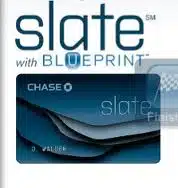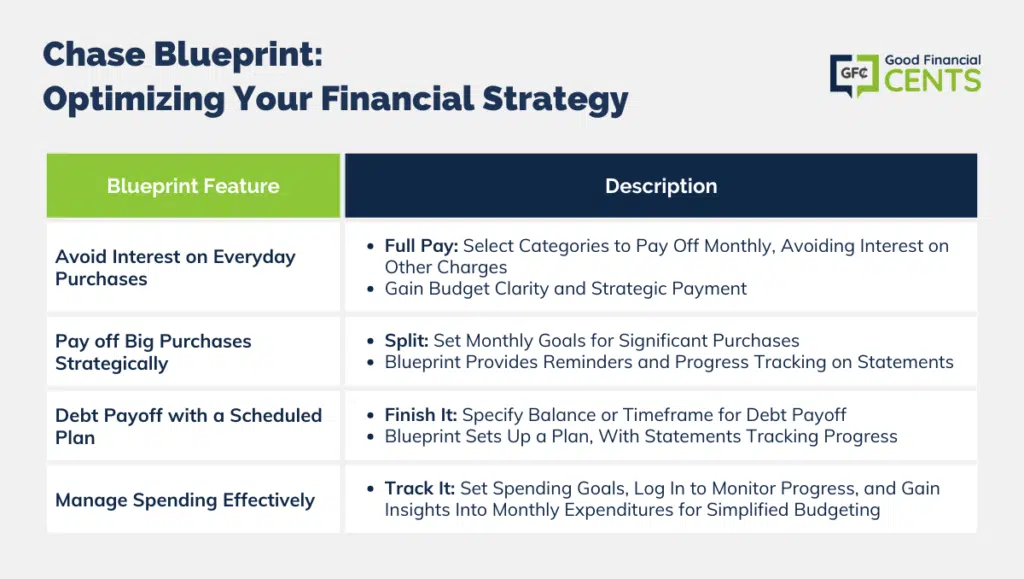
Update: Chase Blueprint is no longer available to new customers.
Have you ever struggled to manage your credit card use? Have you been frustrated to be charged interest on your everyday items while you try to pay down your balance?
A new set of software by Chase Bank called Blueprint aims to help you manage your credit card use and pay off your debt with a plan. This is an exclusive benefit of having certain Chase credit cards. Your other credit card companies can’t offer you access to Blueprint, and not every Chase card qualifies.
Table of Contents
What Is Chase Blueprint?
Blueprint is an online program that Chase credit cardholders get access to. It helps you handle a variety of credit card tasks: from avoiding paying interest to paying off a big balance with a dedicated debt-reduction plan.
What Does Blueprint Help Me With?
There are four specific areas that Blueprint helps you with:
Avoid Interest in Everyday Purchases
With the Full Pay option, you tell Chase which categories of everyday spending you want to pay off in full every month. The company will then separate those charges out on your bill and allow you to pay off that balance in full rather than grouping all of the charges together. This helps you avoid paying interest on the groceries you bought last week even though overall you would still carry a balance on an overall larger debt. Additionally, this can help you with your budget. You know you’re spending $200 per month on groceries and can budget for that… rather than spending $200 plus interest.
Pay off a Big Purchase With a Plan
Another option with Blueprint is called Split. This lets you select a recent purchase and tell Chase how quickly you want to pay off the charge. How might this help? Let’s say your refrigerator died and you had to unexpectedly spend $750 last month on your credit card to replace it. You know you have an extra $250 every month to throw at the balance. Instead of having to remember to pay that much each month, Blueprint will remind you. Also, on each statement you receive, you will see your progress toward your debt payoff goal shown. This can help you stay motivated to pay off the fridge and get on to bigger and better things with your money.
Pay Off Your Debt With a Scheduled Plan
The third option with Blueprint — Finish It — is fantastic. Who knew your credit card company could help you get out of credit card debt?
With this part of the program, you tell Chase how much of a balance you want to pay off. You also pick either when you want to be out of debt or how much money you have to put toward the balance. Blueprint does the math and sets up the payment plan for you. As you make progress with your payments every month you will get an update on every statement showing how you’re getting closer to paying off the debt.
Keep Yourself From Spending Too Much
Raise your hand if you like setting up and tracking your spending on a monthly budget.
No one?
With the last portion of Chase Blueprint called Track It you are able to set spending goals on certain categories of spending. You can log in at any time to track your progress toward that spending. This can help you figure out what an average month looks like in your spending and make setting up a budget a lot easier.

Which Chase Credit Cards Come with Blueprint?
Not every Chase credit card comes with access to Blueprint. Currently, you can get Blueprint with one of these cards:
Chase Slate® card
- Apply for the Chase Slate® card and get no balance transfer fees for the first 60 days of card ownership, plus 0% APR for a full 15 months. (Read our full review of this limited-time offer.)
Chase Sapphire Preferred® card
- Earn 50,000 points after you spend just $4,000 on your card within 90 days.
- Rack up Chase Ultimate Rewards points, which are the most flexible travel points on the market, and make this one of the best travel cards.
- $95 annual fee waived the first year.
Chase Freedom
- If you don’t need to transfer a balance and want to maximize your cash-back rewards, Chase Freedom is a great option. You’ll receive 5% cash back on specific categories that change every 3 months, plus 1% back on all other purchases.
- Earn a sweet signup bonus after spending just $500 on your card within 90 days.
Ink Plus® for Business
- Earn 60,000 points after you spend just $5,000 on your card within 90 days.
- Earn 5X points at office supply stores and on internet and cell phone purchases, plus 2x points at gas stations and hotels, and 1x points on all other purchases.
Unfortunately, none of the branded cards work with Blueprint. So if you have one of the airline miles credit cards or hotel rewards credit cards that is branded for a specific company, they are not eligible for Blueprint, even though they are managed by Chase.
Conclusion
Chase Blueprint presented an innovative approach to credit card management, allowing users to tackle debt and manage finances more effectively through its tailored features. Unfortunately, this tool is no longer available to new customers. It offered a structured way to pay off large purchases, reduce interest on everyday items, and even create a solid plan to eliminate credit card debt altogether.
The various options within Blueprint, including Full Pay, Split, Finish It, and Track It, addressed different aspects of credit management, providing users with a comprehensive tool to take control of their finances. While it was limited to certain Chase credit cards and excluded branded airline and hotel rewards cards, it was a valuable resource for eligible cardholders. The discontinuation of Chase Blueprint leaves a gap in the market for comprehensive credit card management tools, underscoring the importance of such resources in helping consumers navigate their financial journey, stay on budget, and work towards a debt-free life.
How We Review Banking or Financial Institutions:
Good Financial Cents undertakes a comprehensive review of banking and financial institutions, analyzing service offerings, customer satisfaction, and financial stability. Our intention is to provide readers with a balanced overview, aiding them in their financial journey. We consistently emphasize editorial transparency.
We source data from these institutions, reviewing account offerings and other key services. This data, when combined with our in-depth research, forms the foundation of our evaluation. Institutions are subsequently rated on a range of criteria, resulting in a star rating from one to five.
For further insight into the criteria we use to rate banking and financial institutions and our evaluation approach, please refer to our editorial guidelines and full disclaimer.
Product Name: Chase Product Description: Chase Blueprint was an innovative program designed to help Chase credit cardholders manage their debts and finances more efficiently. The program offered a range of tools to create customized payment plans, helping users to pay off large purchases, reduce interest on daily expenses, and systematically eliminate credit card debt. Exclusive to certain Chase credit cards, Blueprint stood out as a unique offering in the credit management space. Summary of Chase Blueprint Chase Blueprint provided an array of features aimed at giving cardholders greater control over their credit usage and repayment strategies. The “Full Pay” feature allowed users to identify categories for everyday spending, enabling them to pay off these balances in full each month to avoid interest charges. With the “Split” option, cardholders could select specific large purchases to pay down at their own pace, receiving reminders and progress updates on statements. The “Finish It” feature helped users establish a clear plan to pay off existing credit card debt, while “Track It” allowed for the setting and monitoring of monthly spending goals. By offering these personalized tools, Chase Blueprint empowered users to navigate their financial journey with more confidence and clarity. Pros Cons
Chase Blueprint
Overall







